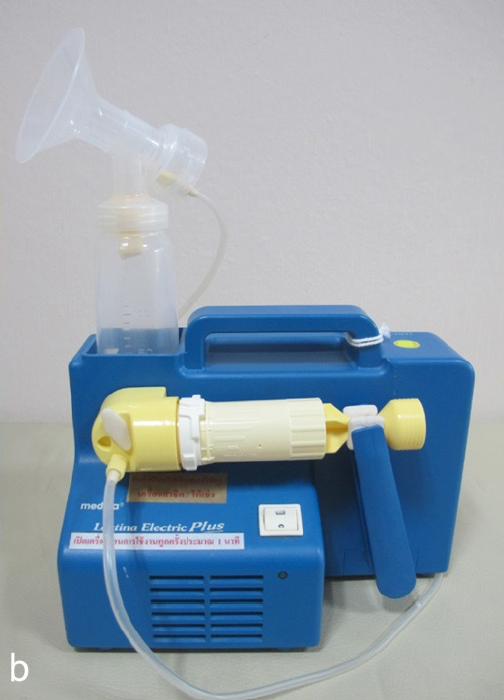Effectiveness of Ayurved Siriraj Prasa-Nam-Nom Recipe on Breast Milk Volume in Early Postpartum Women: A Randomized, Double-Blind, Placebo- Controlled Trial
DOI:
https://doi.org/10.33192/Smj.2022.2Keywords:
Creamatocrit, galactagogue, prolactin, inadequate breast milk volume, Prasa-nam-nomAbstract
Objective: To explore the effectiveness of Ayurved Siriraj Prasa-Nam-Nom (ASPNN) recipe on breast milk production in early postpartum women.
Methods: Fifty-four normal vaginal term delivery mothers who had inadequate milk volume were enrolled into this randomized, double-blind, placebo-controlled trial. All participants received ASPNN or placebo 1,500 mg three times/day for 3 days in the hospital and 7 days at home. Primary outcomes, including breast milk volume, %creamatocrit, and level of prolactin, were evaluated on day 1 and day 3. Satisfaction scores, adverse effects, and types of breastfeeding were also determined.
Results: On day 3, milk volume was increased in both groups. The median volume of ASPNN group was 19 ml, while that of the placebo group was 30 ml. The median %creamatocrit of ASPNN and placebo group were 7.17% and 6.98%, respectively. Mean serum prolactin levels of ASPNN and placebo group were 321.76 + 114.23 ng/ml and 323.78 + 116.68 ng/ml, respectively. Although the effects were not difference from the placebo, the reduction of prolactin in ASPNN was lower. Minor adverse effects included skin rash and mild diarrhea. Exclusive breastfeeding rate on day 11 in ASPNN and placebo group were 92.6 % and 88.5%, respectively.
Conclusion: Short term ASPNN supplementation produce no direct effect on breast milk volume, creamatocrit, and serum prolactin. It was safe and might help maintaining serum prolactin. A future trial with more participants and longer period should be conducted to confirm the effect of ASPNN on breast milk quantity and quality.
References
American Academy of Pediatrics. Breastfeeding and the use of human milk. Pediatrics. 2012;129(3):e827.
World Health Organization. Breastfeeding 2018 [cited 2021 Jan 03]. Available from: https://www.who.int/news-room/facts-in pictures/detail/breastfeeding.
Rollins NC, Bhandari N, Hajeebhoy N, Horton S, Lutter CK, Martines JC, et al. Why invest, and what it will take to improve breastfeeding practices? Lancet. 2016;387(10017):491-504.
Chanprapaph P, Luttarapakul J, Siribariruck S, Boonyawanichkul S. Outcome of non-protractile nipple correction with breast cups in pregnant women: a randomized controlled trial. Breastfeed Med. 2013;8(4):408-12.
Li R, Fein SB, Chen J, Grummer-Strawn LM. Why mothers stop breastfeeding: mothers’ self-reported reasons for stopping during the first year. Pediatrics. 2008;122 Suppl 2:S69-76.
Brown CR, Dodds L, Legge A, Bryanton J, Semenic S. Factors influencing the reasons why mothers stop breastfeeding. Can J Public Health. 2014;105(3):e179-85.
Domperidone. Drugs and Lactation Database (LactMed). Bethesda (MD): National Library of Medicine (US); 2006.
Suwannatrai U, Tungsukrutai P, Visesmanee S, Stieanrut P, Boriboonhirunsarn D, Akarasereenont P, et al. The efficacy of hot salt pot compression in postpartum women: a randomized controlled trial. J Thai Trad Altern Med. 2014;12(2):144-58.
Maya D, Bale B, Samson G, Basile T, Raymond B. Phytochemical composition, toxicity, antioxidant and lactogenic activities of Euphorbia hirta (L.). Int J of Adv Res. 2018;6(8):322-35.
Koko B, Konan A, Kouacou F, Djétouan J, Amonkan A. Galactagogue effect of Euphorbia hirta (Euphorbiaceae) aqueous leaf extract on milk production in female Wistar rats. JBM. 2019;7(9).
Tuntratuang K. Effectiveness comparison between domperidone and galactagogue on stimulating milk of maternal postpartum with caesarean section. Udonthani Hospital Medical Journal. 2017; 25(2):131-5.
Jankaew K, Narumitmontri T. The effects of herbal milk nourishing medication on the levels of milk flow in postpartum mothers. TJPHS. 2020;3(2):41-51.
Chanprapaph P, Jentanomma O, Boriboonhirunsarn D. The Correlation of Lactating Women’s Breast Size and Breast Milk Production. Siriraj Med J 2007;59:284-6.
Lin HY, Hsieh HY, Chen HH, Chiu HY, Lin HC, Su BH. Efficacy of creamatocrit technique in evaluation of premature infants fed with breast milk. Pediatr Neonatol. 2011;52(3):130-4.
Morton JA. Pre-glandular, glandular and post-glandular causes for insufficient milk production. ABM News View. 2003;9(2):13.
Puapornpong P, Aimjirakul K, Chomtho S, Dumrongwongsiri O, editors. Clinical practice of breastfeeding: Thai Breastfeeding; 2016.
Grzeskowiak LE, Wlodek ME, Geddes DT. What evidence do we have for pharmaceutical galactagogues in the treatment of lactation insufficiency?-a narrative review. Nutrients. 2019;11(5):974.

Published
How to Cite
Issue
Section
License
Authors who publish with this journal agree to the following conditions:
Copyright Transfer
In submitting a manuscript, the authors acknowledge that the work will become the copyrighted property of Siriraj Medical Journal upon publication.
License
Articles are licensed under a Creative Commons Attribution-NonCommercial-NoDerivatives 4.0 International License (CC BY-NC-ND 4.0). This license allows for the sharing of the work for non-commercial purposes with proper attribution to the authors and the journal. However, it does not permit modifications or the creation of derivative works.
Sharing and Access
Authors are encouraged to share their article on their personal or institutional websites and through other non-commercial platforms. Doing so can increase readership and citations.














